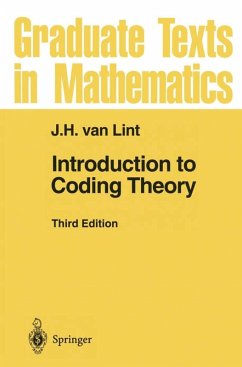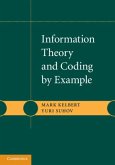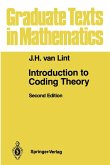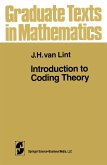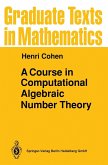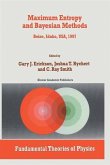J. H. Van Lint
Introduction to Coding Theory (eBook, PDF)
64,95 €
64,95 €
inkl. MwSt.
Sofort per Download lieferbar

32 °P sammeln
64,95 €
Als Download kaufen

64,95 €
inkl. MwSt.
Sofort per Download lieferbar

32 °P sammeln
Jetzt verschenken
Alle Infos zum eBook verschenken
64,95 €
inkl. MwSt.
Sofort per Download lieferbar
Alle Infos zum eBook verschenken

32 °P sammeln
J. H. Van Lint
Introduction to Coding Theory (eBook, PDF)
- Format: PDF
- Merkliste
- Auf die Merkliste
- Bewerten Bewerten
- Teilen
- Produkt teilen
- Produkterinnerung
- Produkterinnerung

Bitte loggen Sie sich zunächst in Ihr Kundenkonto ein oder registrieren Sie sich bei
bücher.de, um das eBook-Abo tolino select nutzen zu können.
Hier können Sie sich einloggen
Hier können Sie sich einloggen
Sie sind bereits eingeloggt. Klicken Sie auf 2. tolino select Abo, um fortzufahren.

Bitte loggen Sie sich zunächst in Ihr Kundenkonto ein oder registrieren Sie sich bei bücher.de, um das eBook-Abo tolino select nutzen zu können.
- Geräte: PC
- ohne Kopierschutz
- eBook Hilfe
- Größe: 26.22MB
Andere Kunden interessierten sich auch für
![Information Theory and Coding by Example (eBook, PDF) Information Theory and Coding by Example (eBook, PDF)]() Mark KelbertInformation Theory and Coding by Example (eBook, PDF)30,95 €
Mark KelbertInformation Theory and Coding by Example (eBook, PDF)30,95 €![Introduction to Coding Theory (eBook, PDF) Introduction to Coding Theory (eBook, PDF)]() J. H. Van LintIntroduction to Coding Theory (eBook, PDF)64,95 €
J. H. Van LintIntroduction to Coding Theory (eBook, PDF)64,95 €![Introduction to Coding Theory (eBook, PDF) Introduction to Coding Theory (eBook, PDF)]() J. H. Van LintIntroduction to Coding Theory (eBook, PDF)64,95 €
J. H. Van LintIntroduction to Coding Theory (eBook, PDF)64,95 €![Maximum Entropy and Bayesian Methods Garching, Germany 1998 (eBook, PDF) Maximum Entropy and Bayesian Methods Garching, Germany 1998 (eBook, PDF)]() Maximum Entropy and Bayesian Methods Garching, Germany 1998 (eBook, PDF)112,95 €
Maximum Entropy and Bayesian Methods Garching, Germany 1998 (eBook, PDF)112,95 €![Combinatorics and Finite Geometry (eBook, PDF) Combinatorics and Finite Geometry (eBook, PDF)]() Steven T. DoughertyCombinatorics and Finite Geometry (eBook, PDF)28,95 €
Steven T. DoughertyCombinatorics and Finite Geometry (eBook, PDF)28,95 €![A Course in Computational Algebraic Number Theory (eBook, PDF) A Course in Computational Algebraic Number Theory (eBook, PDF)]() Henri CohenA Course in Computational Algebraic Number Theory (eBook, PDF)46,95 €
Henri CohenA Course in Computational Algebraic Number Theory (eBook, PDF)46,95 €![Maximum Entropy and Bayesian Methods (eBook, PDF) Maximum Entropy and Bayesian Methods (eBook, PDF)]() G. EricksonMaximum Entropy and Bayesian Methods (eBook, PDF)112,95 €
G. EricksonMaximum Entropy and Bayesian Methods (eBook, PDF)112,95 €-
-
-
Produktdetails
- Verlag: Springer Berlin Heidelberg
- Seitenzahl: 234
- Erscheinungstermin: 6. Dezember 2012
- Englisch
- ISBN-13: 9783642585753
- Artikelnr.: 53156611
Dieser Download kann aus rechtlichen Gründen nur mit Rechnungsadresse in A, B, BG, CY, CZ, D, DK, EW, E, FIN, F, GR, HR, H, IRL, I, LT, L, LR, M, NL, PL, P, R, S, SLO, SK ausgeliefert werden.
- Herstellerkennzeichnung Die Herstellerinformationen sind derzeit nicht verfügbar.
1 Mathematical Background.- 1.1. Algebra.- 1.2. Krawtchouk Polynomials.- 1.3. Combinatorial Theory.- 1.4. Probability Theory.- 2 Shannon's Theorem.- 2.1. Introduction.- 2.2. Shannon's Theorem.- 2.3. On Coding Gain.- 2.4. Comments.- 2.5. Problems.- 3 Linear Codes.- 3.1. Block Codes.- 3.2. Linear Codes.- 3.3. Hamming Codes.- 3.4. Majority Logic Decoding.- 3.5. Weight Enumerators.- 3.6. The Lee Metric.- 3.7. Comments.- 3.8. Problems.- 4 Some Good Codes.- 4.1. Hadamard Codes and Generalizations.- 4.2. The Binary Golay Code.- 4.3. The Ternary Golay Code.- 4.4. Constructing Codes from Other Codes.- 4.5. Reed-Muller Codes.- 4.6. Kerdock Codes.- 4.7. Comments.- 4.8. Problems.- 5 Bounds on Codes.- 5.1. Introduction: The Gilbert Bound.- 5.2. Upper Bounds.- 5.3. The Linear Programming Bound.- 5.4. Comments.- 5.5. Problems.- 6 Cyclic Codes.- 6.1. Definitions.- 6.2. Generator Matrix and Check Polynomial.- 6.3. Zeros of a Cyclic Code.- 6.4. The Idempotent of a Cyclic Code.- 6.5. Other Representations of Cyclic Codes.- 6.6. BCH Codes.- 6.7. Decoding BCH Codes.- 6.8. Reed-Solomon Codes.- 6.9. Quadratic Residue Codes.- 6.10. Binary Cyclic Codes of Length 2n(n odd).- 6.11. Generalized Reed-Muller Codes.- 6.12. Comments.- 6.13. Problems.- 7 Perfect Codes and Uniformly Packed Codes.- 7.1. Lloyd's Theorem.- 7.2. The Characteristic Polynomial of a Code.- 7.3. Uniformly Packed Codes.- 7.4. Examples of Uniformly Packed Codes.- 7.5. Nonexistence Theorems.- 7.6. Comments.- 7.7. Problems.- 8 Codes over ?4.- 8.1. Quaternary Codes.- 8.2. Binary Codes Derived from Codes over ?4.- 8.3. Galois Rings over ?4.- 8.4. Cyclic Codes over ?4.- 8.5. Problems.- 9 Goppa Codes.- 9.1. Motivation.- 9.2. Goppa Codes.- 9.3. The Minimum Distance of Goppa Codes.- 9.4. Asymptotic Behaviour of Goppa Codes.- 9.5. Decoding Goppa Codes.- 9.6. Generalized BCH Codes.- 9.7. Comments.- 9.8. Problems.- 10 Algebraic Geometry Codes.- 10.1. Introduction.- 10.2. Algebraic Curves.- 10.3. Divisors.- 10.4. Differentials on a Curve.- 10.5. The Riemann-Roch Theorem.- 10.6. Codes from Algebraic Curves.- 10.7. Some Geometric Codes.- 10.8. Improvement of the Gilbert-Varshamov Bound.- 10.9. Comments.- 10.10.Problems.- 11 Asymptotically Good Algebraic Codes.- 11.1. A Simple Nonconstructive Example.- 11.2. Justesen Codes.- 11.3. Comments.- 11.4. Problems.- 12 Arithmetic Codes.- 12.1. AN Codes.- 12.2. The Arithmetic and Modular Weight.- 12.3. Mandelbaum-Barrows Codes.- 12.4. Comments.- 12.5. Problems.- 13 Convolutional Codes.- 13.1. Introduction.- 13.2. Decoding of Convolutional Codes.- 13.3. An Analog of the Gilbert Bound for Some Convolutional Codes.- 13.4. Construction of Convolutional Codes from Cyclic Block Codes.- 13.5. Automorphisms of Convolutional Codes.- 13.6. Comments.- 13.7. Problems.- Hints and Solutions to Problems.- References.
1 Mathematical Background.- 1.1. Algebra.- 1.2. Krawtchouk Polynomials.- 1.3. Combinatorial Theory.- 1.4. Probability Theory.- 2 Shannon's Theorem.- 2.1. Introduction.- 2.2. Shannon's Theorem.- 2.3. On Coding Gain.- 2.4. Comments.- 2.5. Problems.- 3 Linear Codes.- 3.1. Block Codes.- 3.2. Linear Codes.- 3.3. Hamming Codes.- 3.4. Majority Logic Decoding.- 3.5. Weight Enumerators.- 3.6. The Lee Metric.- 3.7. Comments.- 3.8. Problems.- 4 Some Good Codes.- 4.1. Hadamard Codes and Generalizations.- 4.2. The Binary Golay Code.- 4.3. The Ternary Golay Code.- 4.4. Constructing Codes from Other Codes.- 4.5. Reed-Muller Codes.- 4.6. Kerdock Codes.- 4.7. Comments.- 4.8. Problems.- 5 Bounds on Codes.- 5.1. Introduction: The Gilbert Bound.- 5.2. Upper Bounds.- 5.3. The Linear Programming Bound.- 5.4. Comments.- 5.5. Problems.- 6 Cyclic Codes.- 6.1. Definitions.- 6.2. Generator Matrix and Check Polynomial.- 6.3. Zeros of a Cyclic Code.- 6.4. The Idempotent of a Cyclic Code.- 6.5. Other Representations of Cyclic Codes.- 6.6. BCH Codes.- 6.7. Decoding BCH Codes.- 6.8. Reed-Solomon Codes.- 6.9. Quadratic Residue Codes.- 6.10. Binary Cyclic Codes of Length 2n(n odd).- 6.11. Generalized Reed-Muller Codes.- 6.12. Comments.- 6.13. Problems.- 7 Perfect Codes and Uniformly Packed Codes.- 7.1. Lloyd's Theorem.- 7.2. The Characteristic Polynomial of a Code.- 7.3. Uniformly Packed Codes.- 7.4. Examples of Uniformly Packed Codes.- 7.5. Nonexistence Theorems.- 7.6. Comments.- 7.7. Problems.- 8 Codes over ?4.- 8.1. Quaternary Codes.- 8.2. Binary Codes Derived from Codes over ?4.- 8.3. Galois Rings over ?4.- 8.4. Cyclic Codes over ?4.- 8.5. Problems.- 9 Goppa Codes.- 9.1. Motivation.- 9.2. Goppa Codes.- 9.3. The Minimum Distance of Goppa Codes.- 9.4. Asymptotic Behaviour of Goppa Codes.- 9.5. Decoding Goppa Codes.- 9.6. Generalized BCH Codes.- 9.7. Comments.- 9.8. Problems.- 10 Algebraic Geometry Codes.- 10.1. Introduction.- 10.2. Algebraic Curves.- 10.3. Divisors.- 10.4. Differentials on a Curve.- 10.5. The Riemann-Roch Theorem.- 10.6. Codes from Algebraic Curves.- 10.7. Some Geometric Codes.- 10.8. Improvement of the Gilbert-Varshamov Bound.- 10.9. Comments.- 10.10.Problems.- 11 Asymptotically Good Algebraic Codes.- 11.1. A Simple Nonconstructive Example.- 11.2. Justesen Codes.- 11.3. Comments.- 11.4. Problems.- 12 Arithmetic Codes.- 12.1. AN Codes.- 12.2. The Arithmetic and Modular Weight.- 12.3. Mandelbaum-Barrows Codes.- 12.4. Comments.- 12.5. Problems.- 13 Convolutional Codes.- 13.1. Introduction.- 13.2. Decoding of Convolutional Codes.- 13.3. An Analog of the Gilbert Bound for Some Convolutional Codes.- 13.4. Construction of Convolutional Codes from Cyclic Block Codes.- 13.5. Automorphisms of Convolutional Codes.- 13.6. Comments.- 13.7. Problems.- Hints and Solutions to Problems.- References.
